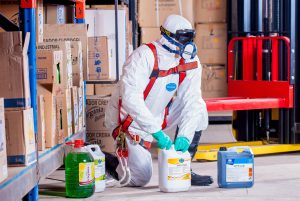Chemicals are everywhere – they keep our watches ticking, and our cars running. They are in the medicines we buy, the food we eat, and the clothes we wear. In some ways, chemicals are the physical embodiment of progress, human development, and scientific, technological, and agricultural innovation. They have enabled farmers to grow more food and have played a vital role in numerous industries. However, with the prevalence of chemical pollutants across multiple facets of daily life, we have reached a critical juncture where our planetary boundaries are being pushed to the limit. The overuse and mismanagement of certain chemicals are causing more harm than good. Toxic chemicals, when not handled properly, pose severe threats to human and planetary health. This exposure hampers life expectancy and impacts human wellbeing, making pollution, alongside climate change and nature loss, a significant obstacle to ending poverty on a livable planet.
The Enormity of Chemical Pollution
New research has shed light on the magnitude of the dangers posed by chemical pollution. Startling evidence indicates that in 2019 alone, exposure to lead resulted in over 5.5 million premature deaths, with 90% of these occurring in lower- and middle-income countries. Moreover, during the same year, children under the age of five lost a staggering 765 million IQ points due to lead poisoning. This loss of human capital has profound implications for the quality of life, educational outcomes, productivity, and, ultimately, economic development and growth. The economic cost of health damages related to chemical pollution reached a staggering $6 trillion in 2019, equivalent to 6.9% of the global GDP.
Unintended Consequences of Nitrogen-based Fertilizers
Nitrogen-based fertilizers, widely used to enrich agricultural soils, exemplify how chemicals can impact both people and the planet. Astonishingly, only 40% of the nitrogen applied to crops is absorbed, with the remaining 60% released into the air or leached into water. This leads to the creation of massive dead zones in bodies of water, where wildlife is decimated. Additionally, when nitrogen-based fertilizers, such as ammonia, enter the air, they can transform into secondary fine particles and nitrogen oxides, contributing to millions of premature deaths due to air pollution. Furthermore, a portion of the nitrogen released into the atmosphere becomes nitrous oxide, a greenhouse gas that is 300 times more potent than carbon dioxide. Chemical pollution is closely intertwined with the climate crisis, as climate change can exacerbate the presence of unsafe chemicals in the environment.
Other Chemicals of Concern in Our Daily Lives
Cadmium, a chemical commonly found in batteries, electronics, paint, and even some foods, poses significant health risks, including cardiovascular issues, kidney failure, and cancer. Asbestos, notorious for causing lung cancer, is still used as an insulation material in several countries, despite being banned in most high-income nations. It is a stark reminder that chemical pollution knows no borders and can affect people worldwide.
A Call to Action for Policymakers
The impacts of chemical pollution are a stark reminder that we cannot prioritize development today and address pollution later. It is essential to take immediate and proactive steps to manage and mitigate chemical pollution. Here are three critical actions that policymakers can undertake:
- Measurement and Data Collection: Currently, there is no uniform approach to measuring chemical pollution. Governments, academia, and development partners must collaborate to establish global protocols for measuring chemicals in the environment and in people. The World Bank has already proposed guidelines for this purpose.
- Precautionary Principle: Policymakers should adopt the “precautionary principle” as a default approach to chemical safety. This means that chemicals should be proven safe before their widespread use. A dose of skepticism towards new chemicals is necessary to protect human and environmental health.
- Evidence-Based Policies: Policymakers should develop evidence-based policy frameworks that include stringent environmental and safety standards, measures to hold polluters accountable, and the removal of environmentally harmful subsidies, which currently receive trillions in government spending each year.
Conclusion
Chemical pollution presents a critical challenge that requires immediate attention and action. The impacts are far-reaching, affecting human health, ecosystems, and the economy. To secure a truly livable planet that supports the health of both people and the environment, we must act swiftly and decisively to address the pollution crisis. It’s not a choice between development and environmental protection; it’s a call for sustainable development that prioritizes the wellbeing of our planet and future generations. The time to act is now, for the sake of a healthier, more sustainable world.












